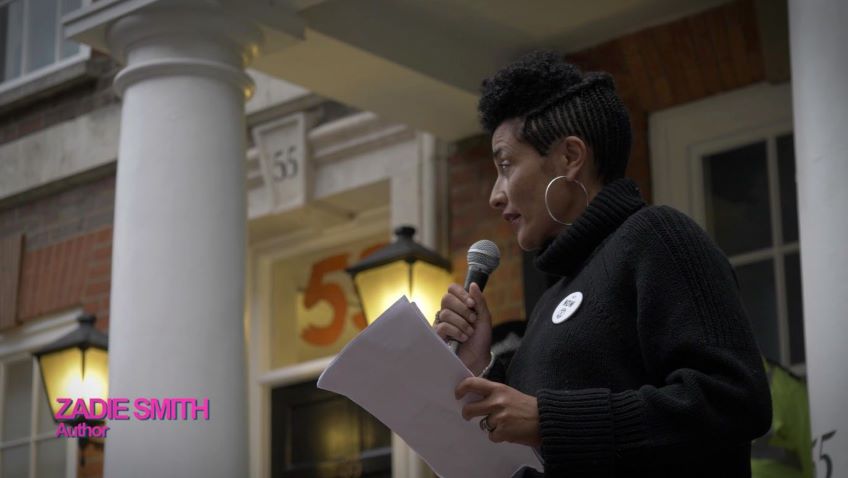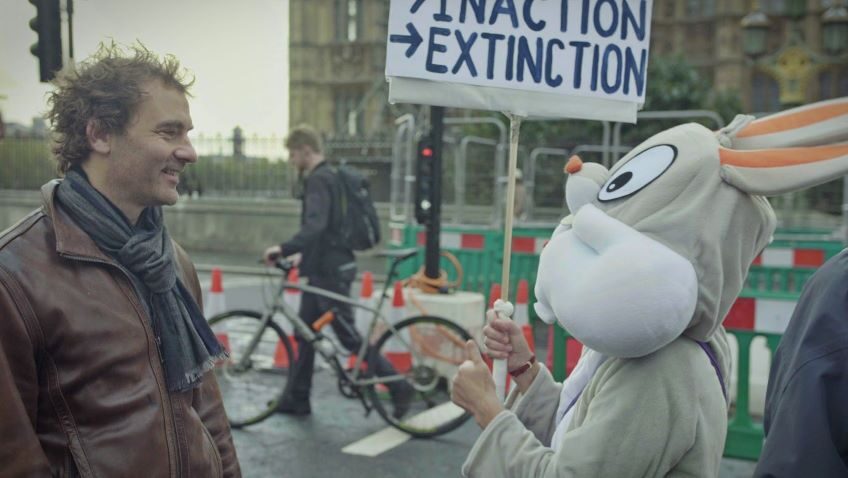Joyce Glasser reviews My Extinction (June 29, 2023) Cert PG, 80 mins. In cinemas.
Josh Appignanesi (The Infidel, Song of Songs), the hands-on filmmaker and protagonist of My Extinction is the reason this cinéma-vérité feature might just be the most enjoyable and relatable environmental documentary of the year. That might sound like an oxymoron, as most films in the genre are more worthy and anguishing than enticing. Josh, a middle-class London-based filmmaker and family man with curly hair and a healthy appetite is no Werner Herzog or David Attenborough. It’s doubtful he’d recognise a Zootoca vivipara or know the annual percentage rate of the loss of arctic ice caps. And that’s why he’s the perfect Everyman, taking us with him in his journey from concerned passivist to committed activist.
The father of two young boys dodges questions about climate change as he focuses on the edit of a car commercial, reassured that the feature film on which he has invested five years of his life will liberate him from the necessity of making commercials to pay the bills. With the sudden news that the funding on his ticket to Hollywood has fallen through, climate change is a minor irritation distracting him from the more pressing question. What is he going to do? Return to teaching?
Sitting on the couch in his living room where furniture is replaced by children’s toys, it is hard to escape climate change. He switches on the news and it’s all about Extinction Rebellion. He turns on the computer and searches Greta Thunberg.

Josh does a few recces chatting with people with tents and banners and stops in at a kind of group therapy session. You could laugh, but Josh is no cynic. He listens to “eco-anxiety” psychiatrist, Anouchka Grose who warns not to unload your anxieties on your children, but not to lie. Soon Grose is in the flat helping Josh figure out where he went wrong telling his distressed son about the rising sea levels.
Josh cares about his children’s future, but he’s not a joiner and his aspiration is to fly to Hollywood to make movies, where he’d need a car. Is he ready for Extinction Rebellion?
It is when Josh meets Writers Rebel co-founder Chloe Aridjis, that he finds a place for himself, amongst people who, like him, make a living from writing. Writers Rebel was founded in the summer of 2019, when a small group of writers discussed literature’s lack of engagement with the climate and ecological crisis. What Extinction Rebellion needed was a squad of Rachel Carsons to awaken the population to the immediacy of climate change and provoke government and industry to take action.
Whether Josh set out to make a documentary in lieu of the commercial film that fell through is a moot point. He shot the footage which would ultimately form the bulk of this film between 2019 and 2021. The chronology is less important than the change in Josh’s personality, confidence and commitment. Just before the Westminster Bridge project he asks, ‘if not me, who? If not now, when?’
Returning from Westminster Bridge, he speaks like a General home from a gruelling but exhilarating battle. ‘Yeah, it was great but we lost the bridge in less than an hour. After you left the police came in. I don’t know if we still have Trafalgar Square.’
Extinction Rebellion’s October Rebellion is launched at Trafalgar Square by a marathon reading of some forty UK writers, including Simon Schama, Robert Macfarlane, Ali Smith, Philip Hoare and Susie Orbach, while Zadie Smith and Margaret Atwood are interviewed and recorded remotely. The pouring rain does not dampen the spirit of protest.

As Josh’s commitment grows, his options narrow, at least in the commercials field. ‘Anything else’, he pleads to his agent when presented with an Esso ad. ‘Bring me a nice McDonalds…’ After a long moral reckoning, he turns down the Esso commercial and then notices that his commercials agent has stopped calling.
Arguably the most engrossing part of the film is the long-planned Tufton Street Protest of April 21, 2021, in which Josh is now a planner, speaker, and the cinematographer. Two weeks before the big event he discusses with his wife the core of the problem: ‘We all know why people put their heads in the sand, but we don’t know how to get them out.’
They agree that people shy away from traumatic knowledge, frustrated they can do nothing about it. Josh fears ending friendships over the issue. His wife suggests he try a different approach and sell himself differently. ‘You always represent yourself as someone with no values, being selfish. It’s embarrassing to you that you are somebody trying to change the world.’
Tufton Street is a political event whose purpose is to draw attention to the infamous address: 55 Tufton Street, Westminster. Josh fears security and police will thwart the protest, but to his and everyone’s surprise, the crowds are not dispersed.
Number 55 is owned by pro-Brexiteer and aerospace industrialist Richard Smith. He is the landlord of the offices of lobby groups and think tanks related to climate science denial, fossil-fuel lobby groups and Brexit. Tenants include The Taxpayers Alliance, Leave Means Leave, the Adam Smith Institute and The Global Warming Policy Foundation (the UK’s principal climate change denial group). At number 57 next door, is the Centre for Policy Studies, the right wing opaque economic “think tank” founded in 1974 to combat Keynesianism and its liberal policies.
Thanks to the presence of celebrities like Mark Rylance and Juliet Stevenson, Zadie Smith and Carline Lucas, the press is out in full to give coverage to the event. Then Josh speaks: ‘Considered an inessential worker, I started this journey in a state of confusion. Then I decided to recycle my rage into activism.’ It’s a terrific speech, but his great contribution to climate change is this unpretentious and sincere documentary.
For a list of screenings and Q & As follow this link.




